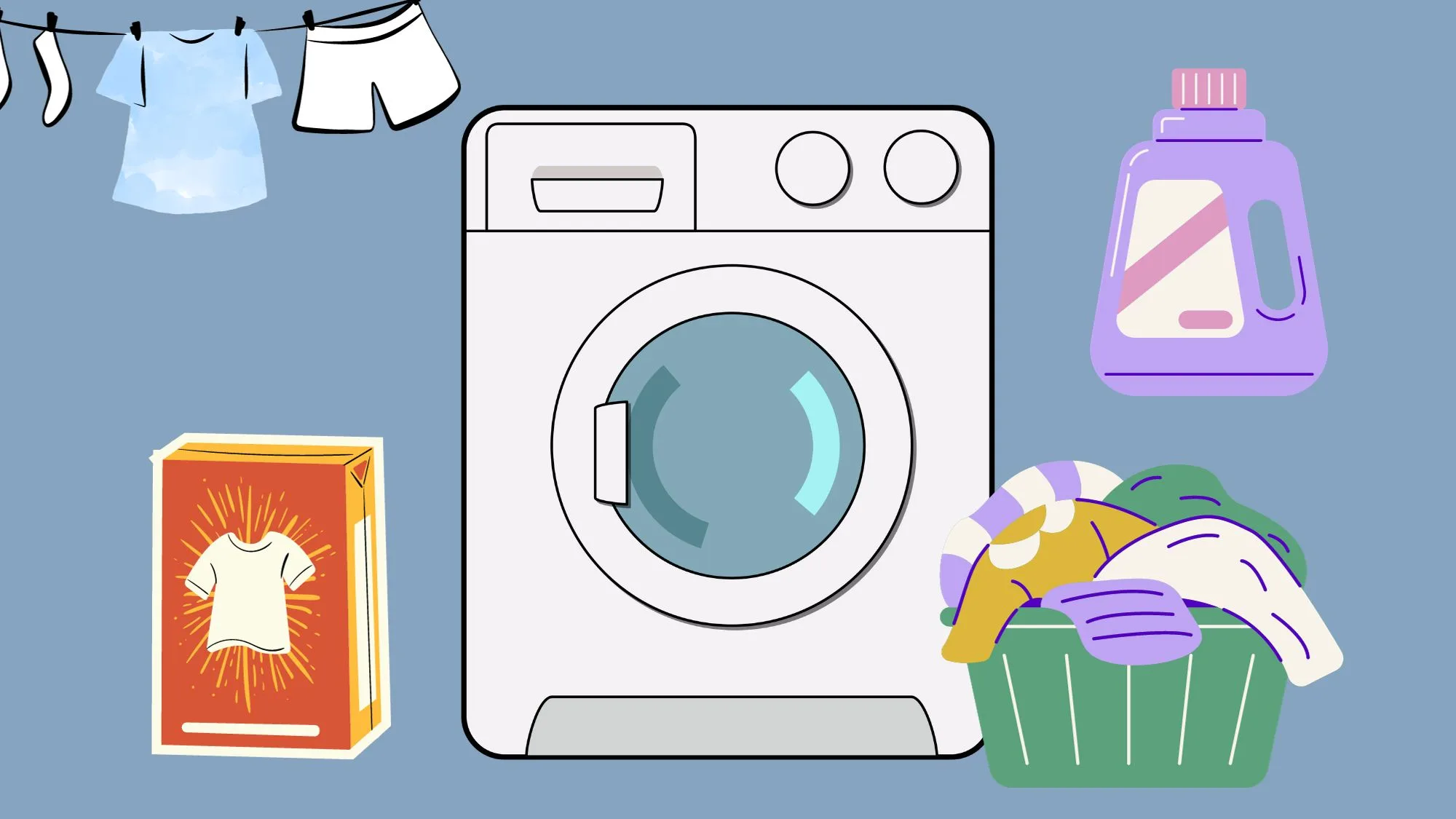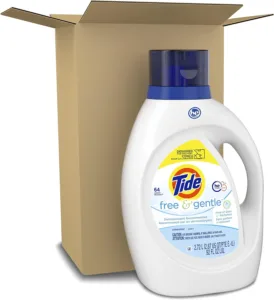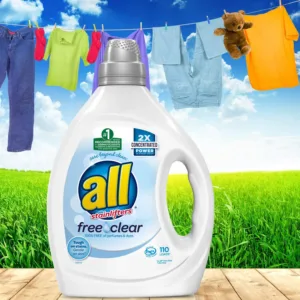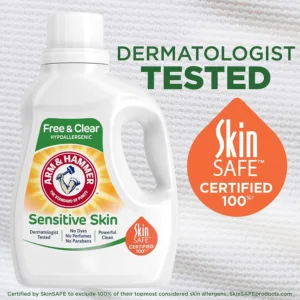
Living with eczema can be a challenging experience. The itchy, dry, and inflamed skin can be both uncomfortable and painful. As someone who has dealt with eczema for many years, I understand the struggle of finding the right laundry detergent that won’t irritate your skin further. In this comprehensive guide, I’ll share with you everything you need to know about choosing the best laundry detergent for eczema and provide you with some top recommendations to consider.[1][2]
Top 3 Best Laundry Detergents for Eczema
-
all Liquid Laundry Detergent.
Experience the next level of cleaning with this all free clear 2X Concentrated Liquid Laundry Detergent. Designed for all washing machines. Including high-efficiency (HE) washers. This concentrated formula delivers 2X more cleaning power in every drop compared to our standard detergent. You can use less while still achieving a superior clean that’s gentle on your skin. Our fragrance-free, hypoallergenic formula is 100% free of perfumes and dyes. Ensuring a fresh and clean laundry experience. Each 82.5-ounce bottle provides enough detergent for 110 loads, making it a powerful and economical choice for your laundry needs.
-
Arm & Hammer Sensitive Skin.
Experience the ideal laundry solution for sensitive skin with ARM & HAMMER Sensitive Skin Free & Clear Liquid Laundry Detergent. This one 105 fl oz bottle cleans 105 medium loads when used as directed, providing a dermatologist-tested and hypoallergenic formula that is gentle on the skin but tough on stains and odors. Certified 100% by SkinSAFE, our dye-free and worry-free detergent contains no perfumes or preservatives. With the trusted power of ARM & HAMMER Baking Soda, this HE detergent is concentrated with 2X powerful stain fighters in every load compared to leading value detergents. Achieve deep cleaning while maintaining gentleness for your sensitive skin.
-
Tide Free & Gentle Laundry Detergent.
Elevate your laundry experience with this detergent that offers a deeper clean while being gentle on the skin compared to the leading national competitor’s detergent. Dermatologist recommended and hypoallergenic, this formula is free of dyes and perfumes. Conveniently measure with the cap, filling just below bar 1 for medium loads, bar 3 for large loads, and bar 5 for HE full loads. Simply add clothes, pour into the dispenser, and start the washer for a superior clean that cares for your skin
 Tide Free & Gentle Laundry Detergent
Tide Free & Gentle Laundry Detergent
Understanding Eczema and Its Triggers
Eczema, also known as atopic dermatitis, is a chronic skin condition that affects millions of people worldwide. It is characterized by dry, itchy, and inflamed skin, which can cause significant discomfort and distress. Eczema can occur at any age, from infancy to adulthood, and can persist throughout a person’s lifetime. While there is currently no cure for eczema, proper care and management can help control symptoms and improve quality of life.
What is Eczema?
Eczema is a complex condition that involves a combination of genetic, environmental, and immunological factors. It is believed to be caused by a combination of genetic predisposition and a compromised skin barrier. The skin barrier, which normally acts as a protective shield, becomes weakened in individuals with eczema, allowing irritants and allergens to penetrate the skin more easily. This leads to inflammation and triggers the characteristic symptoms of eczema.
One of the key features of eczema is its chronic nature. While some people may experience periods of remission, where their symptoms improve or disappear completely, others may have persistent symptoms that require ongoing management. The severity and frequency of symptoms can vary widely from person to person, making eczema a highly individualized condition.
Common Triggers of Eczema
Identifying and avoiding triggers is a crucial part of managing eczema. By understanding the factors that can exacerbate symptoms, individuals with eczema can take proactive steps to minimize flare-ups and maintain healthier skin.
Some common triggers include:
- Harsh chemicals. Exposure to harsh chemicals, such as those found in certain cleaning products, detergents, and personal care items, can irritate the skin and trigger eczema flare-ups. Individuals with eczema need to choose gentle, fragrance-free products that are specifically formulated for sensitive skin.
- Allergens. Allergens play a significant role in triggering eczema symptoms. Common allergens include dust mites, pet dander, pollen, and certain foods. Avoiding or minimizing exposure to these allergens can help reduce the frequency and severity of eczema flare-ups. Regular cleaning, using allergen-proof bedding, and maintaining a clean and dust-free environment can be beneficial.
- Fragrances and dyes. Many personal care products, such as perfumes, lotions, and soaps, contain fragrances and dyes that can irritate sensitive skin and trigger eczema. Opting for fragrance-free and dye-free products can help minimize the risk of flare-ups.
- Extreme temperatures and humidity. Changes in temperature and humidity levels can have a significant impact on eczema-prone skin. Exposure to extreme heat or cold, as well as high or low humidity, can cause the skin to become dry and more susceptible to irritation. It is important to protect the skin by dressing appropriately for the weather and using humidifiers or moisturizers to maintain optimal skin hydration.
- Stress. Stress is known to worsen many skin conditions, including eczema. When a person is under stress, their body releases certain hormones that can trigger inflammation and exacerbate eczema symptoms. Practicing stress management techniques, such as mindfulness, meditation, and exercise, can help reduce stress levels and improve overall well-being.
Important Reminder for Factors that Trigger Eczema
It is important to note that triggers can vary from person to person. What may cause a flare-up in one individual may not affect another. Keeping a journal to track potential triggers and symptoms can help identify personal triggers and develop an individualized management plan.
Eczema is a chronic skin condition characterized by dry, itchy, and inflamed skin. It can be caused by a combination of genetic factors, environmental triggers, and a compromised skin barrier. By understanding common triggers and taking proactive steps to avoid them, individuals with eczema can effectively manage their symptoms and improve their quality of life.[4][5]
The Link Between Laundry Detergent and Eczema
How Laundry Detergent Can Affect Eczema
Believe it or not, your choice of laundry detergent can directly impact your eczema symptoms. Many conventional detergents contain harsh chemicals, fragrances, and dyes that can irritate sensitive skin. These ingredients can strip the skin of its natural oils, leading to dryness and inflammation.
When it comes to managing eczema, every little detail counts. The clothes we wear, the fabrics we surround ourselves with, and even the laundry detergent we use can all play a role in either soothing or exacerbating our skin condition. It’s important to be aware of the potential triggers and make informed choices to minimize discomfort and flare-ups.
For individuals with eczema, the skin barrier is already compromised, making it more susceptible to irritants. Laundry detergents that contain fragrances, dyes, and other harsh chemicals can further disrupt the delicate balance of the skin, triggering itching, redness, and inflammation. The constant exposure to these irritants can lead to a vicious cycle of eczema flare-ups and discomfort.
Ingredients to Avoid in Laundry Detergents
When searching for a laundry detergent suitable for eczema-prone skin, it’s important to steer clear of certain ingredients. Look out for detergents that are free of:
- Fragrances
- Dyes
- Optical brighteners
- Chlorine bleach
- Phosphates
Let’s delve deeper into each of these ingredients and understand why they can be problematic for individuals with eczema:
Fragrances. Fragrances are commonly added to laundry detergents to give clothes a pleasant scent. However, these fragrances are often synthetic and can cause allergic reactions or skin irritation, especially for those with eczema. Opting for fragrance-free detergents can help minimize the risk of triggering eczema symptoms.
Dyes. Dyes are used to give detergents a vibrant color, but they can also be a source of irritation for sensitive skin. These are often made from synthetic chemicals that can penetrate the skin and cause inflammation. Choosing dye-free detergents can be a safer option for individuals with eczema.
Optical brighteners. Optical brighteners are chemicals that make fabrics appear brighter and whiter. While they may enhance the visual appeal of clothes, they can also leave a residue on the fabric, which can irritate eczema-prone skin. Avoiding detergents with optical brighteners can help reduce the risk of skin irritation.
Chlorine bleach. Chlorine bleach is a powerful disinfectant commonly used in laundry to remove stains and kill bacteria. However, it can be harsh on the skin and cause dryness and irritation. Individuals with eczema should opt for bleach-free detergents to minimize the risk of aggravating their skin condition.
Phosphates. Phosphates are chemicals used in detergents to help remove dirt and stains. While they may be effective in cleaning clothes, they can also be harmful to the environment and potentially irritate sensitive skin. Choosing phosphate-free detergents can be a more eco-friendly and skin-friendly choice for individuals with eczema.
By avoiding these ingredients in laundry detergents, individuals with eczema can take a proactive step towards managing their condition. It’s important to read labels carefully and opt for detergents specifically formulated for sensitive skin or labeled as “eczema-friendly.” Additionally, considering hypoallergenic options can further reduce the risk of skin irritation and discomfort.[6]
Choosing the Right Laundry Detergent for Eczema
Eczema is a common skin condition that can cause dryness, itching, and inflammation. One important aspect of managing eczema is choosing the right laundry detergent. The detergent you use can have a significant impact on the health of your skin. In this article, we will explore the key features of eczema-friendly detergents and discuss the difference between hypoallergenic and non-bio detergents.
Key Features of Eczema-Friendly Detergents
When selecting a laundry detergent for eczema, keep an eye out for the following features:
- Fragrance-free formulation. Fragrances can be a common trigger for eczema flare-ups. Opting for a fragrance-free detergent can help minimize the risk of irritation.
- Hypoallergenic. Hypoallergenic detergents are specifically designed to minimize the chance of an allergic reaction. They are formulated to be gentle on the skin and reduce the risk of irritation.
- Free of harsh chemicals and irritants. Harsh chemicals and irritants, such as dyes and preservatives, can exacerbate eczema symptoms. Look for detergents that are free of these potential triggers.
- Gentle on the skin. Eczema-prone skin is often sensitive and delicate. Choosing a detergent that is gentle on the skin can help prevent further irritation and maintain the skin’s natural barrier.
- Dermatologist-recommended. Seeking recommendations from dermatologists or healthcare professionals can be beneficial when choosing a laundry detergent for eczema. They can provide valuable insights and suggest specific brands or formulations that are suitable for your skin condition.
Hypoallergenic vs Non-Bio: What’s the Difference?
Two main types of laundry detergents are often recommended for eczema sufferers: hypoallergenic and non-bio detergents.
Hypoallergenic detergents are specially formulated to minimize the chance of an allergic reaction. They are free of common irritants, such as fragrances and dyes, making them a suitable choice for individuals with sensitive skin. These detergents undergo rigorous testing to ensure they are less likely to cause skin irritation or trigger eczema flare-ups.
Non-bio detergents, on the other hand, do not contain enzymes. Enzymes found in bio detergents can sometimes trigger an allergic reaction in individuals with eczema. Non-bio detergents are milder and less likely to irritate. They are a popular choice for those with sensitive skin or a history of eczema.
It’s important to note that every individual’s skin is unique, and what works for one person may not work for another. It may require some trial and error to find the perfect laundry detergent for your eczema. Additionally, it’s recommended to avoid using fabric softeners or dryer sheets, as they can also contain potential irritants.
Remember, maintaining good laundry hygiene is crucial for managing eczema. Washing your clothes, bedding, and towels with a suitable detergent can help reduce the risk of skin irritation and keep your skin feeling comfortable and healthy.
Tips for Washing Clothes for Eczema Sufferers
Best Practices for Laundry Routine
1. Use the right detergent: Choose a hypoallergenic and fragrance-free detergent that is gentle on the skin.
2. Wash in warm water: Avoid using hot water as it can further dry out the skin. Opt for warm water instead.
3. Rinse thoroughly: Make sure to rinse your clothes thoroughly to remove any detergent residue that may cause irritation.
4. Avoid fabric softeners and dryer sheets: These often contain fragrances and other irritants that can trigger eczema symptoms.
Additional Products to Consider
In addition to using eczema-friendly laundry detergents, there are a few other products you may want to consider to further support your skin’s health:
- Fabric conditioner for sensitive skin
- Wool dryer balls instead of dryer sheets
- Allergen-proof laundry bags for washing delicate items
By following these tips and choosing the right laundry detergent, you can minimize the risk of aggravating your eczema and keep your clothes clean and comfortable. Remember, everyone’s skin is unique, so it may take some trial and error to find the perfect laundry detergent that works for you. Consult with your dermatologist if you have any specific concerns or questions regarding your eczema care routine.[7][8]
Use the CareClinic App to Track Eczema Management
Remember, self-care is an essential part of managing eczema, and the CareClinic app can help you stay on top of your laundry routine and track your symptoms for better management. Don’t let eczema define you; take control of your skin health today!
Managing eczema is about understanding your triggers and the effectiveness of your care routine, and the CareClinic App is the perfect companion for this journey. With the app, you can track your laundry detergent use, note any skin reactions, and monitor your eczema symptoms over time. The CareClinic App also allows you to set reminders for your laundry schedule, ensuring you’re always using the best detergents for your skin. By analyzing this data, you can identify patterns and make informed decisions that lead to better skin health outcomes. Ready to take the next step in your eczema management? Install the CareClinic App today and experience the benefits of personalized health tracking.
References
- “5 Best Laundry Detergents for Sensitive Skin 2025 | Allure”. https://www.allure.com/story/laundry-detergents-for-sensitive-skin
- “The Best Detergent for Eczema-Prone Skin | The Strategist”. https://nymag.com/strategist/article/best-detergent-for-eczema-prone-skin.html
- “12 Best Laundry Detergents for Sensitive Skin | Reader's Digest”. https://www.rd.com/list/laundry-detergent-for-sensitive-skin/
- “Avoid Eczema Triggers | National Jewish Health”. https://www.nationaljewish.org/conditions/eczema/eczema-lifestyle-management/avoid-eczema-irritants
- “How to identify and control eczema triggers without losing your mind | National Eczema Association”. https://nationaleczema.org/blog/tracking-triggers/
- “Laundry Care Tips for Eczema | Detergents | Fabric Softeners”. https://nationaleczema.org/laundry-care-for-people-eczema/
- “Top Care Tips for Eczema Clothing”. https://eczemaclothing.com/pages/caring-for-your-clothes
- “Tips for clothing and detergent | Eczema Foundation”. https://www.pierrefabreeczemafoundation.org/en/be-acompanied/useful-advice/atopic-eczema-tips-clothing-and-detergent

 all Liquid Laundry Detergent
all Liquid Laundry Detergent Arm & Hammer Sensitive Skin
Arm & Hammer Sensitive Skin
